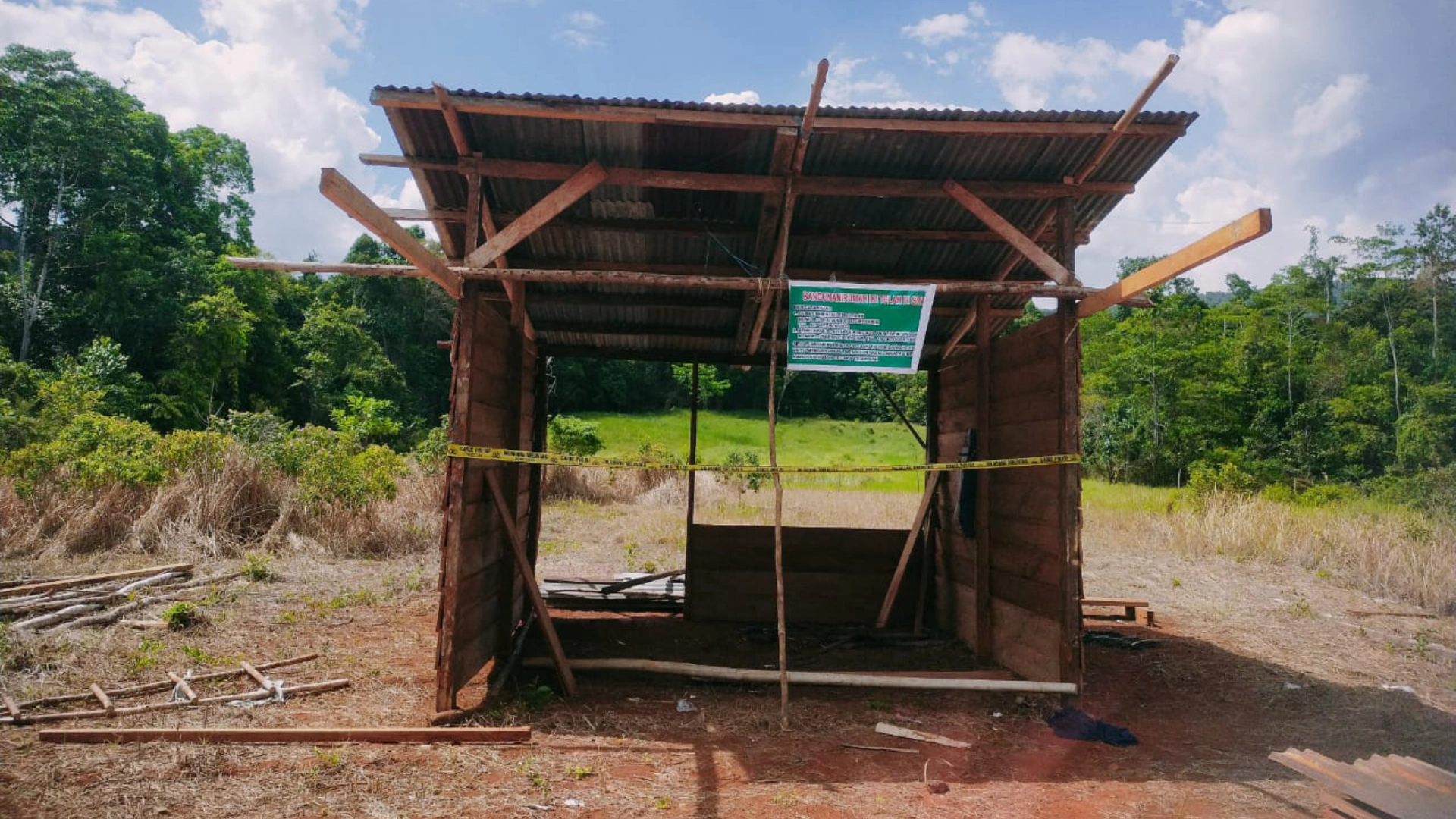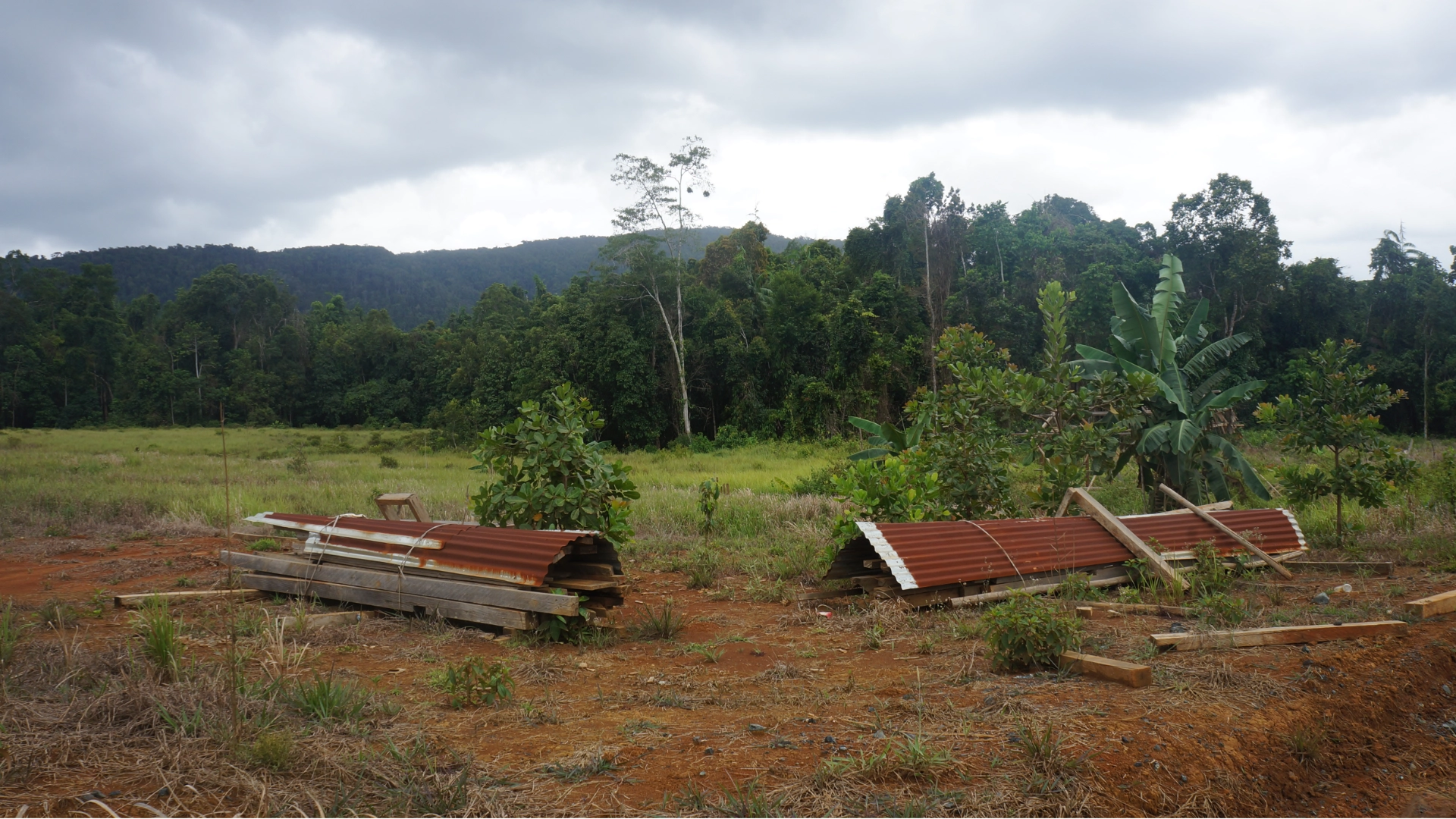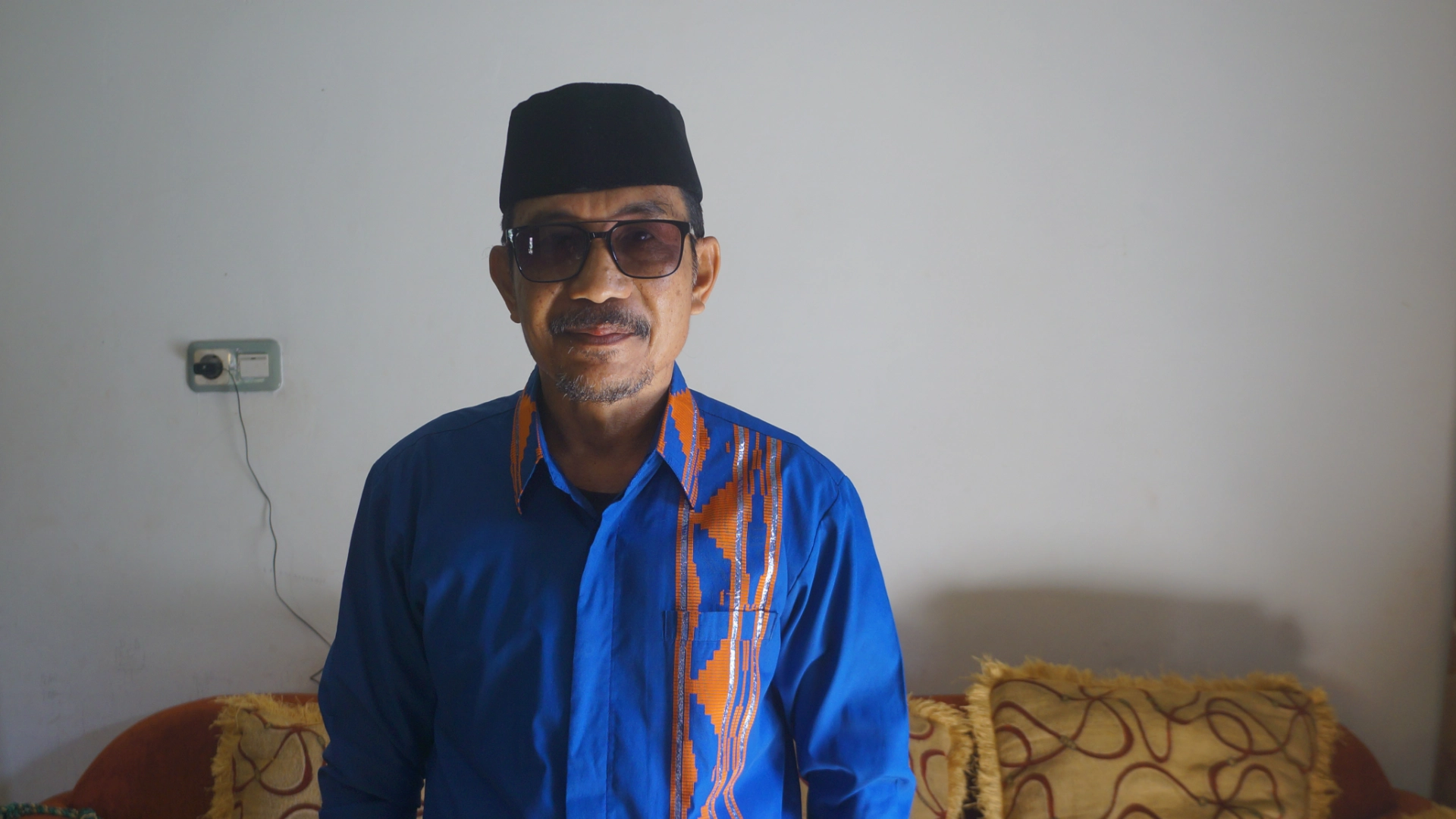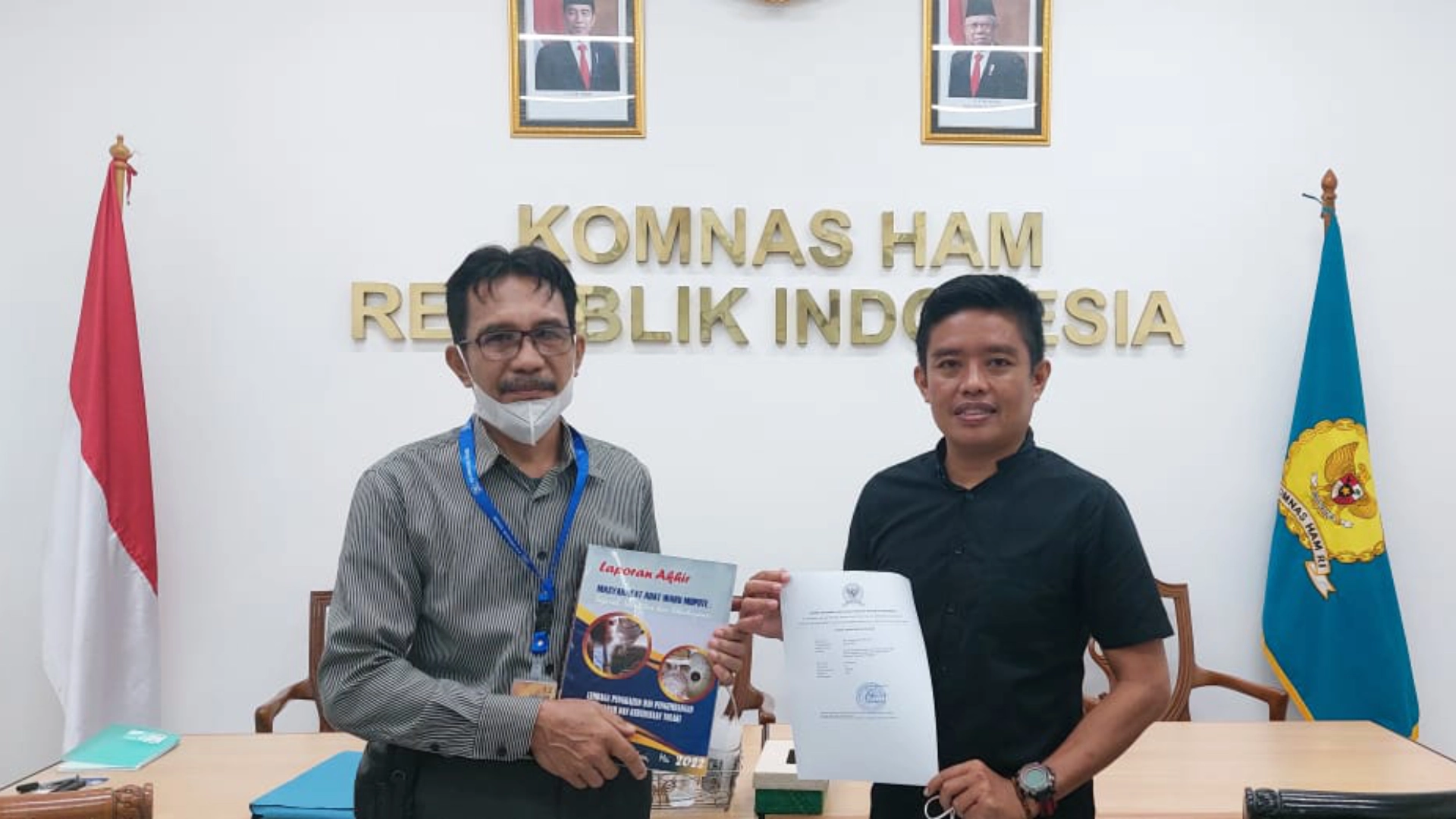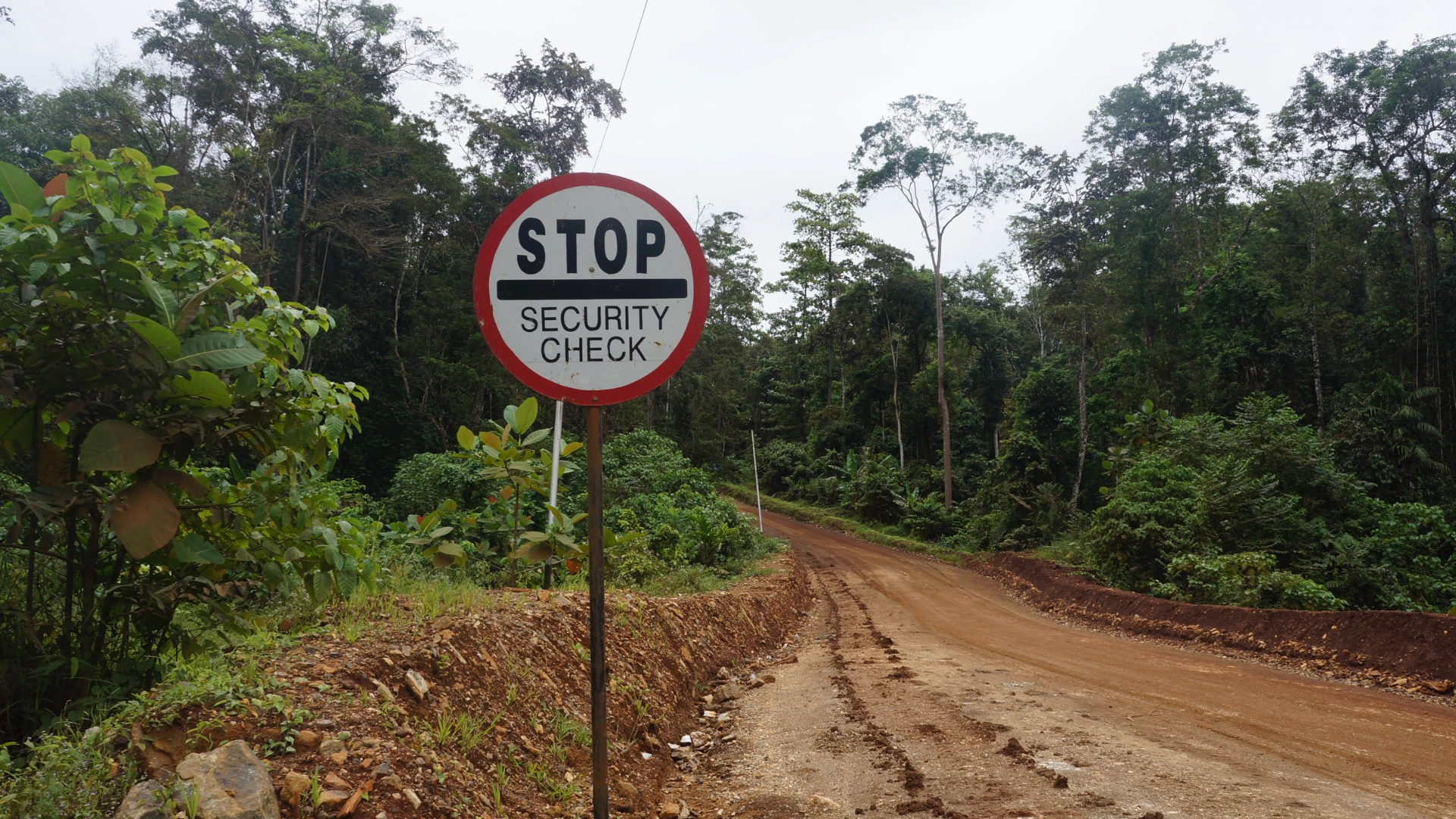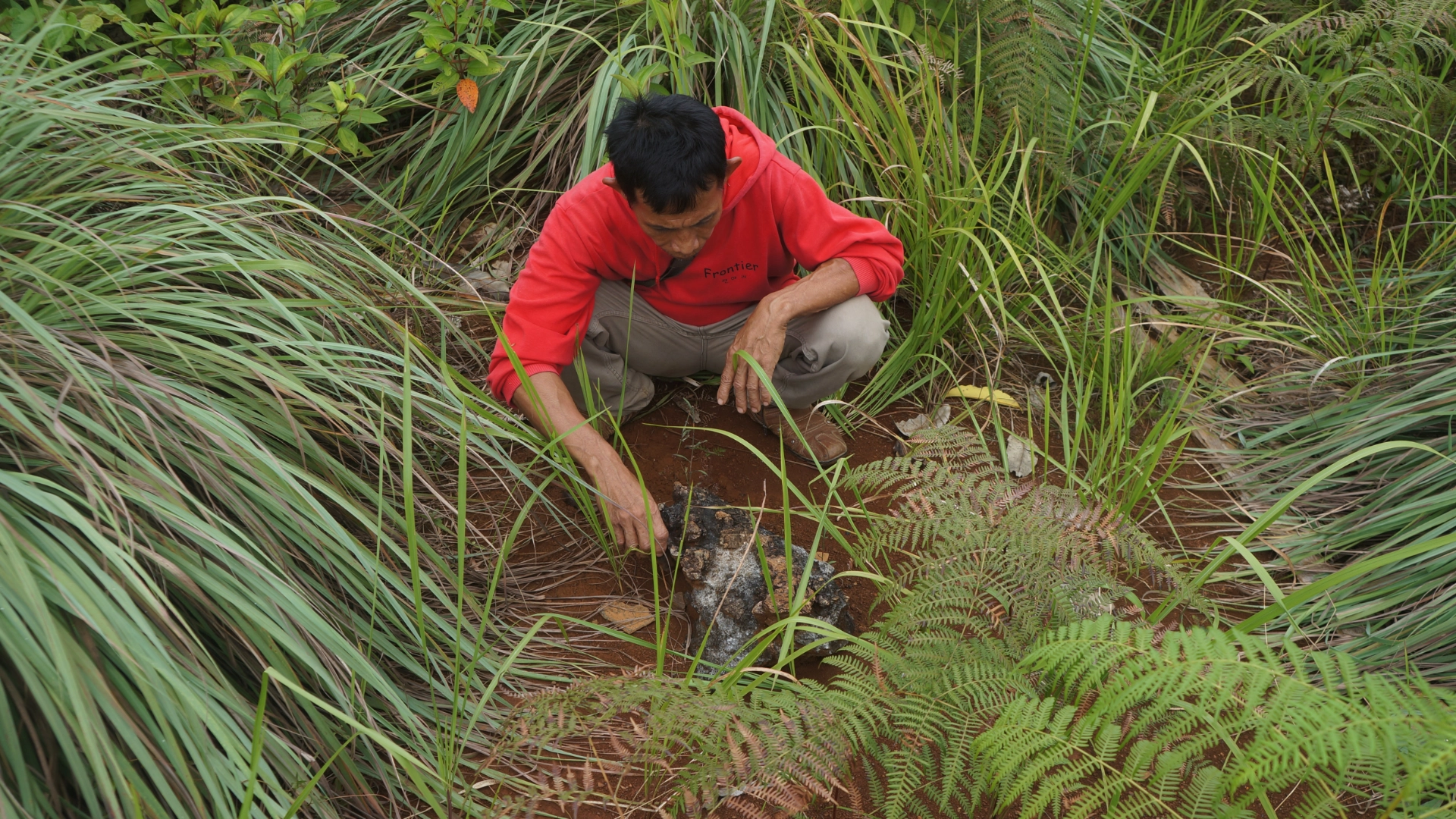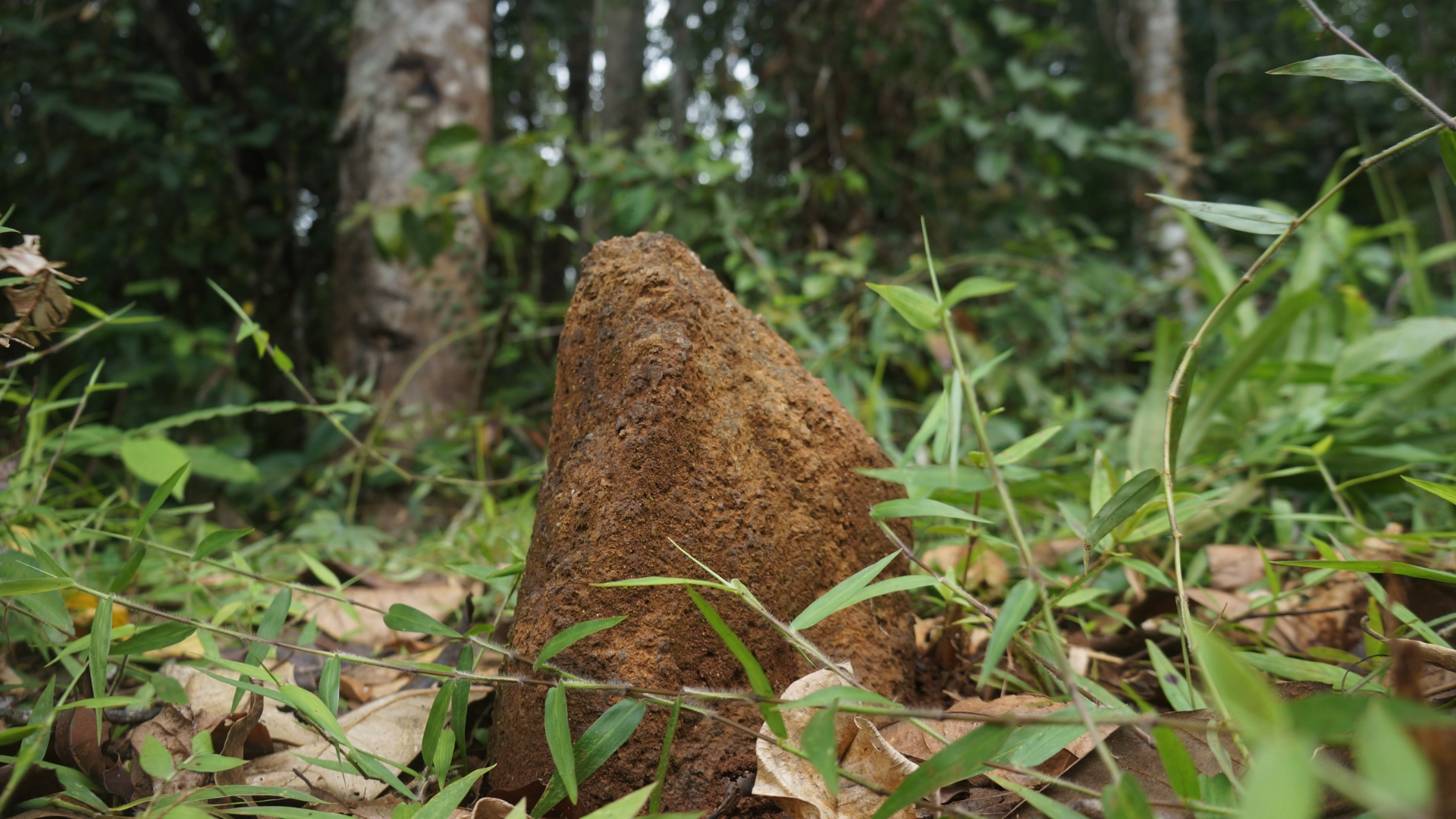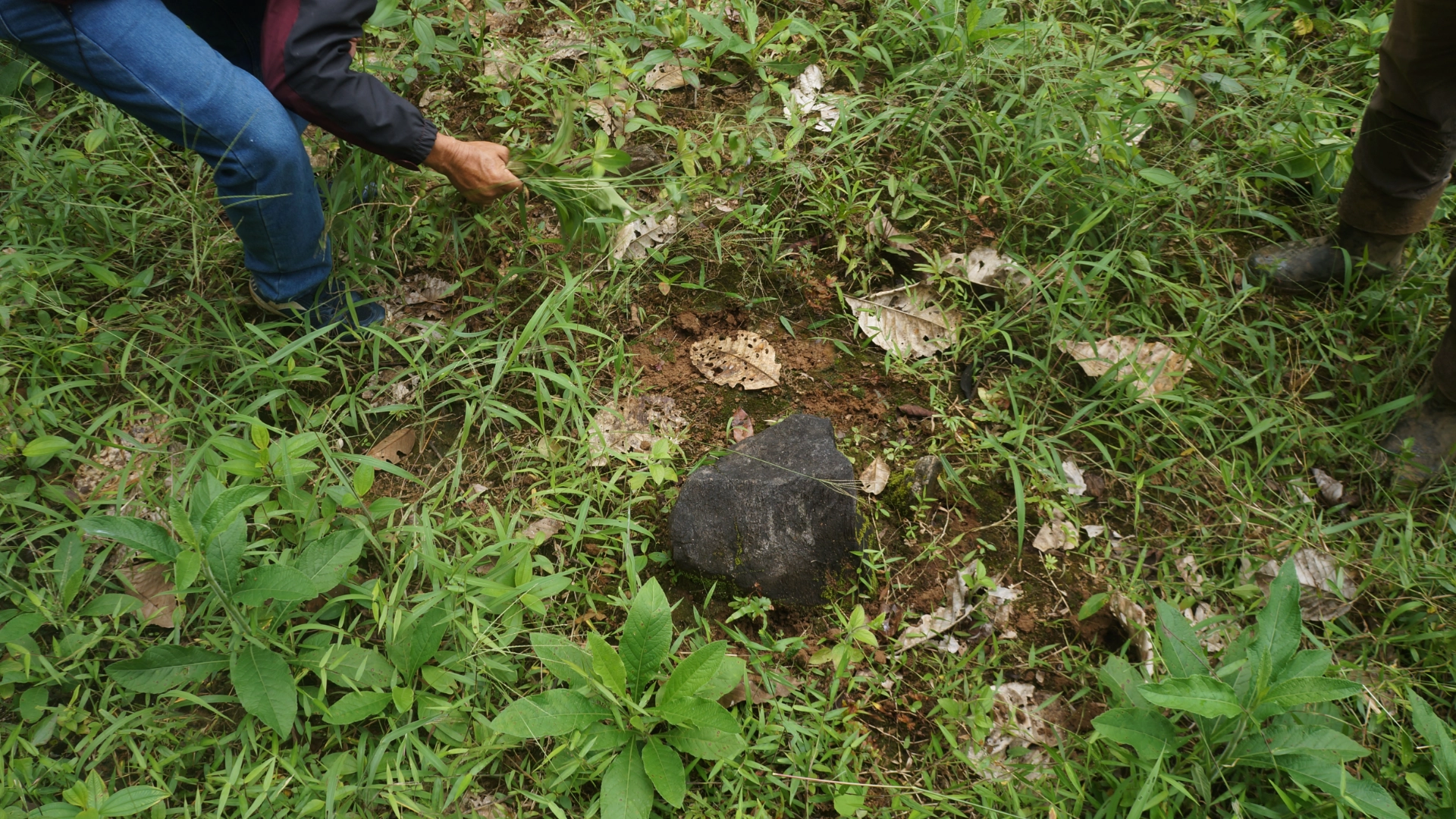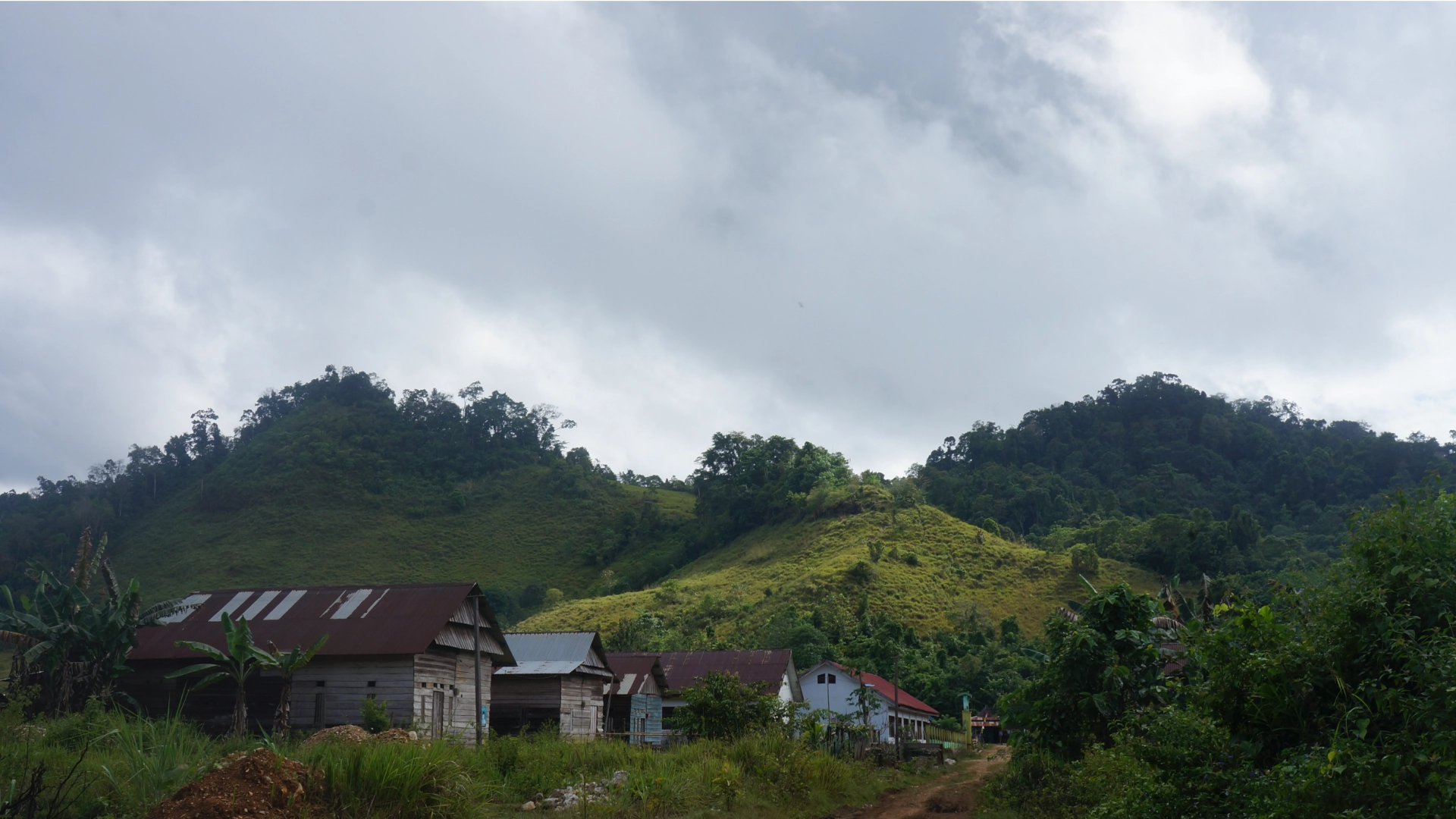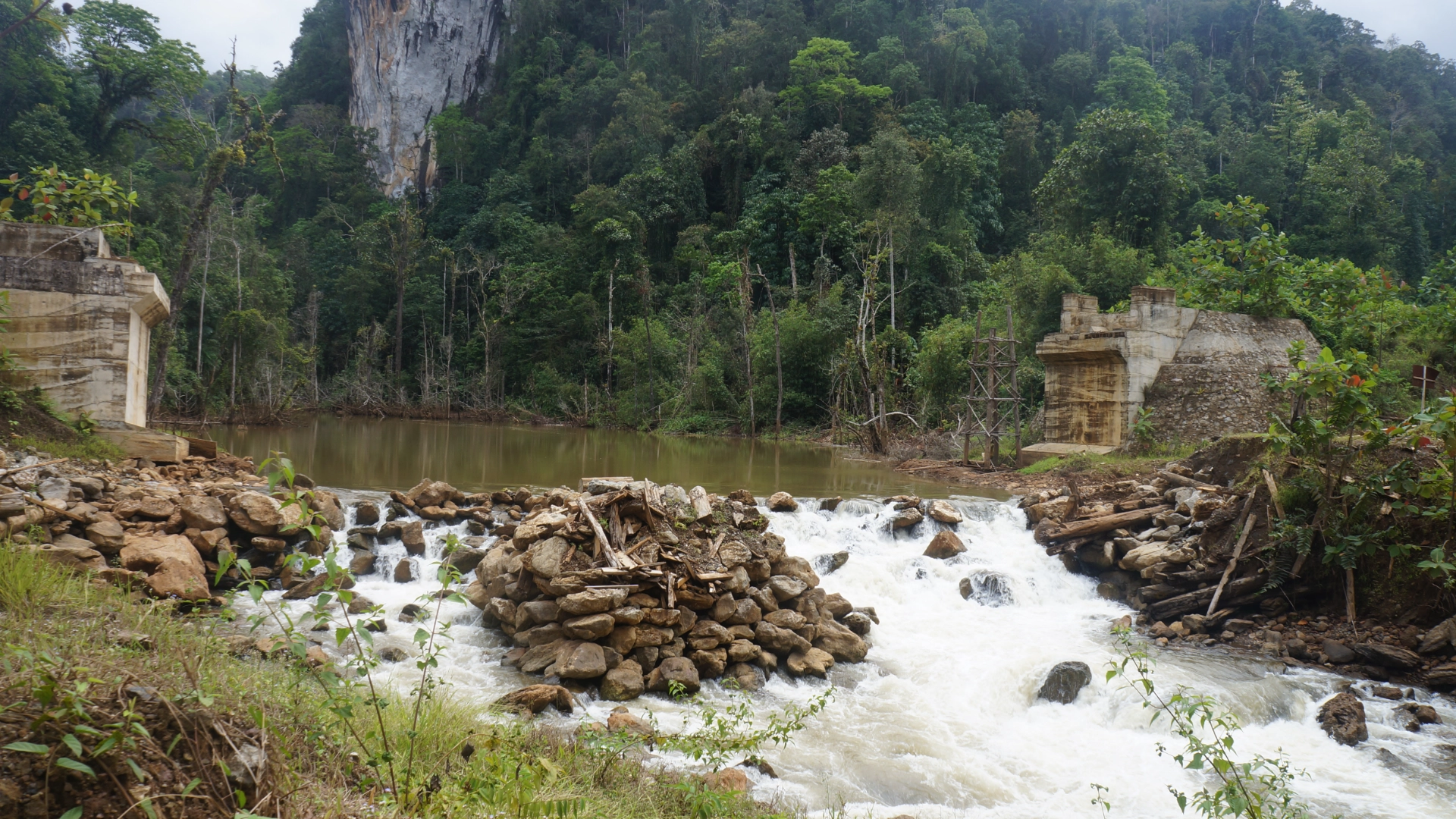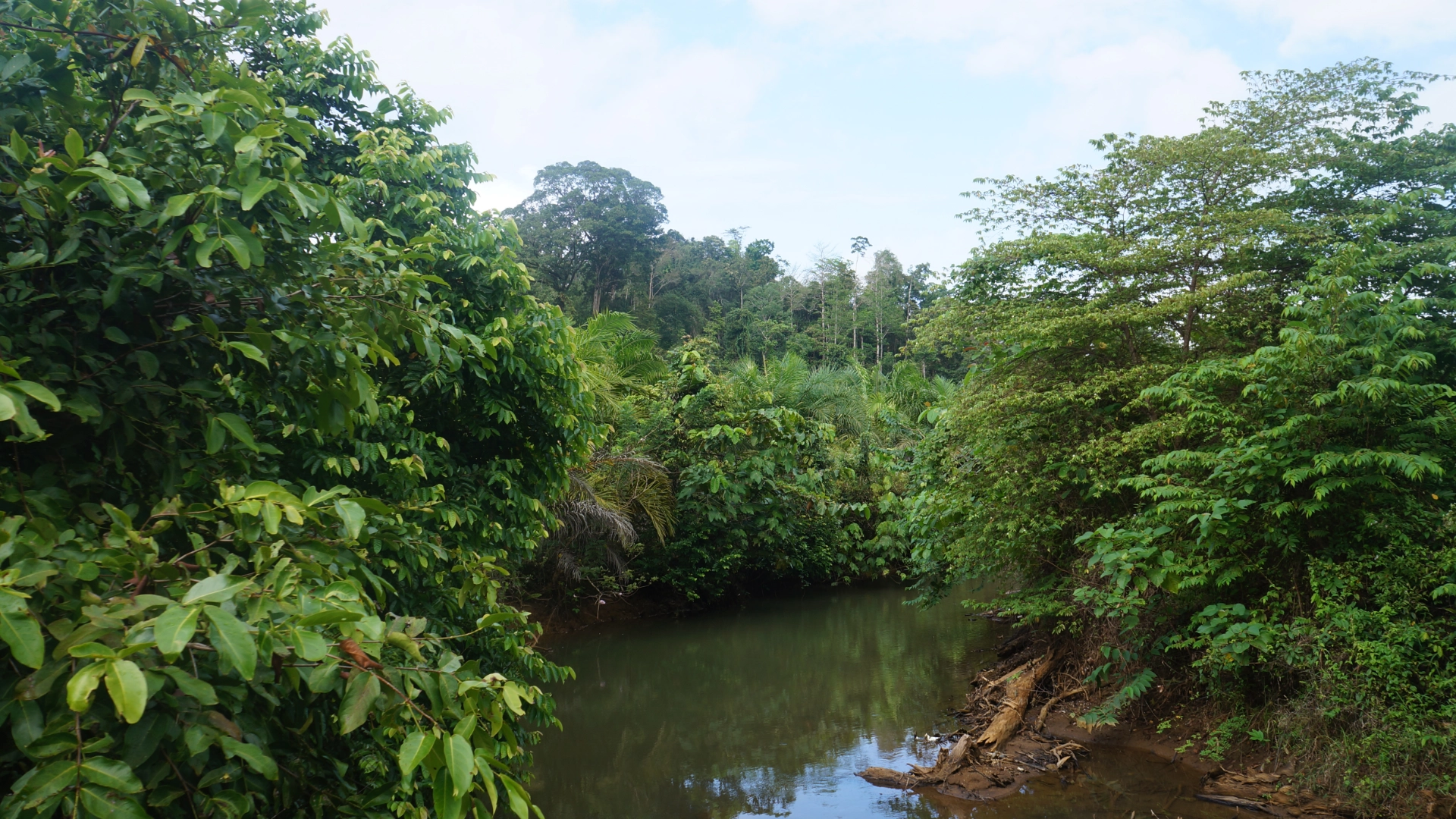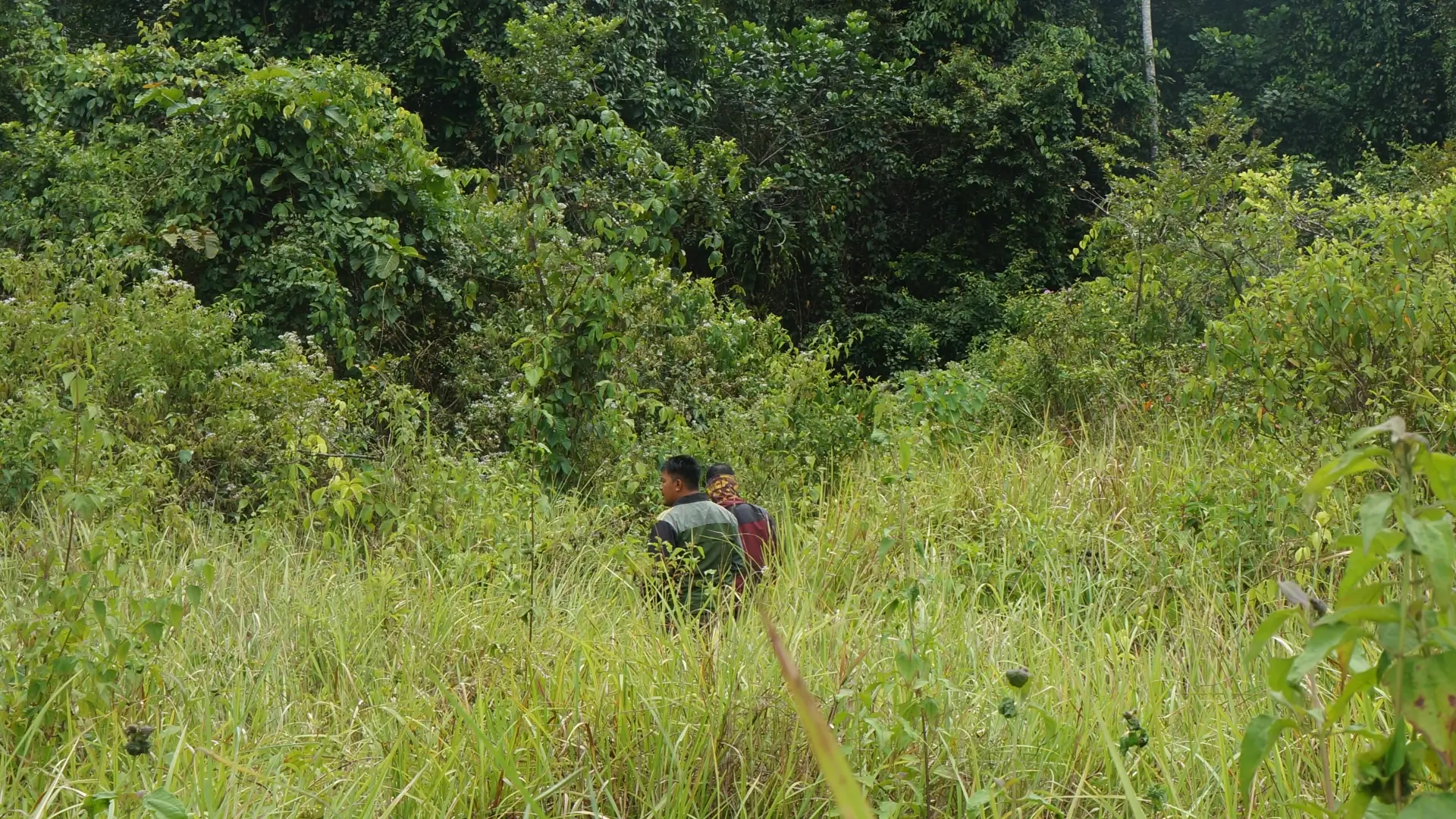

Indonesia
Indonesia turns traditional Indigenous land into nickel industrial zone
Indonesia supplies the EV industry with critical battery materials but the sector’s rapid expansion is infringing the rights of Indigenous peoples

Franco Bravo Dengo
Author & Photographer

Ian Morse
Photographer & Videographer

Indonesia
Indonesia turns traditional Indigenous land into nickel industrial zone
Indonesia supplies the EV industry with critical battery materials but the sector’s rapid expansion is infringing the rights of Indigenous peoples

Franco Bravo Dengo
Author & Photographer

Ian Morse
Author
Wading through weeds and puddles, Antero walked across the land where he once farmed tomatoes and chilli peppers. It has been a year since he last visited the highlands of Sulawesi island in Indonesia, where his indigenous Mopute ancestors have cultivated the densely forested hills and fertile valleys for generations.
Antero hadn’t expected that this lush landscape would become a traumatic place for him. “This used to be my house,” he said, pointing at a pile of wood planks on the ground. Today Antero mostly lives in the nearby village of Lalomerui. But for years, he and many other Mopute people kept small homes and farms on nearby traditional land, where their ancestors are buried.
One night in October 2022, police detained Antero and two other farmers. Officers told them they were trespassing on land now owned by Indonesian nickel mining company Merdeka Battery Materials (MBMA). The three men had previously refused the $900 compensation money the company had offered them for the land.
MBMA controls the nearby Sulawesi Cahaya Mineral (SCM) mine, which holds one of the world’s largest reserves of nickel – a key component to make batteries for electric vehicles.
Backed by financing from some of Indonesia’s richest investors close to the country’s top leadership preparing for a presidential election next week, MBMA acquired this tract of forest to build a nickel processing park for the EV battery industry.
The Indonesian government is hoping the growing nickel sector will help power the country’s economic development and support the world’s energy transition. But the construction of new industrial centres in forest areas without proper consultation with local communities has pitted companies and officials against people who have long relied on their traditional lands.
At the time, police officers told villagers that Antero and the farmers would be released if they tore down their homes, abandoned their farms, and moved on. “I was scared, so I did whatever they said,” said local resident Didin. Like most local people living in this remote part of Indonesia, the Mupote people don’t have land ownership certificates which are recognised by the government.
Antero was released a month later on condition he too demolished his house and left. Both him and Didin now earn a living doing odd jobs.
A shelter near the village of Lalomerui tapped off by police
Dismantled shelters on the Mopute people’s traditional land
Accusations of rights violations
The farmers’ arrest chilled local opposition to the project, putting an end to months of appeals to authorities demanding they recognise the community’s tenure to the land.
Baharuddin Maranai, a Mopute customary leader, told Climate Home that Indigenous communities had not been consulted on the plans – a violation of their constitutional rights to be informed and consulted on extractive projects on their traditional land.
Maranai reported rights violations to the National Commission of Human Rights and to the national parliament, which is examining the complaint. In addition, in a letter to the national police, Baharuddin accused local officers of breaching police ethics by using ”intimidating language” and tactics, such as carrying weapons, to compel people to leave their ancestral village.
Rights NGOs have warned that while the transition to electric vehicles is needed to break the world’s addiction to fossil fuels, the extraction and processing of critical minerals must not repeat the “harmful practices” of past extractive industries.
Neither the police nor MBMA, which went public in April 2023, have responded to repeated requests for interview and comment.
Baharuddin Maranai, customary leader of the Towaru Mopute at his home
Baharuddin Maranai (left) submits a report to the National Commission on Human Rights alleging rights violation. Photo courtesy of Baharuddin Maranai
Quest for EV battery metals
Indonesia holds the world’s largest reserves of nickel – a silvery white metal which increases the energy density and storage capacity of batteries, allowing electric vehicles to get more miles out of a single charge.
Two-thirds of nickel production is used to make stainless steel, which is used in construction, military equipment and the manufacture of towers for wind turbines for example.
The roll out of these clean energy technologies, which are needed to achieve global climate goals, is expected to skyrocket demand for the metal.
Companies have sought out Indonesia to fulfil most of this expected demand. Automakers such as Tesla, Ford, and Volkswagen have contracts to source nickel from Indonesia.
For the past decade, the government has implemented policies to expand nickel mining and processing. In 2014, it banned the export of nickel ore, compelling miners to invest in processing the metal and add value to the resource.
By 2027, Indonesia is expected to account for nearly half of global primary nickel production.
Its nickel strategy is now part of an ambitious economic goal to establish the nation as a global EV hub, from mining and processing minerals, to battery production and eventually EV manufacturing.
Road to the SCM nickel mine in Sulawesi, which holds one of the world’s largest reserves of nickel
Indonesia’s nickel heartland
The forested province of Southeast Sulawesi is the country’s nickel heartland and has become the focus of a multi-billion-dollar effort to build a hub for the mining and processing of nickel for the EV battery supply chain.
It’s here that Merdeka Battery Materials (MBMA) – a subsidiary of the Indonesian metal and mining company Merdeka Copper Gold – intends to become “one of the main suppliers of raw materials for global electric vehicle production” by building a supply chain for battery materials.
Identifying the nickel industry as a strategic priority for development, the government has made it easier for companies to receive permits by overriding other land uses.
Under these provisions, the environment and forestry ministry has allowed MBMA to convert almost 40 square kilometres of “production forest” – a designation which allows local communities to use the forest for subsistence farming and harvesting – into an industrial zone.
The objective is the construction of the Indonesia Konawe Industrial Park (IKIP). Covering 3,500 hectares, about the size of 6,500 football fields, the park will focus on processing nickel for batteries. The nickel limonite ore will come from the nearby SCM mine, in which MBMA owns a controlling stake.
Plants to produce nickel for stainless steel, a solar power plant, a waste storage facility, and a slurry pipeline to move the ore are also planned in the area.
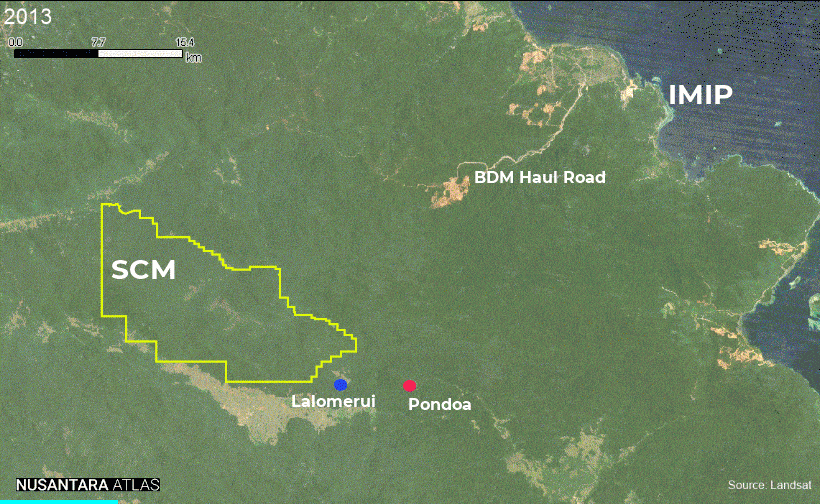
Satellite imagery shows deforestation around the IMIP and IKIP nickel projects in Sulawesi between 2013 and 2023. By TheTreeMap/Nusantara Atlas
Across Indonesia’s mining regions of Sulawesi and North Maluku, nickel mining companies have cleared at least 76,000 hectares of forest – an area about as big as New York City, according to environmental advocacy group Mighty Earth. The NGO has warned that more than half a million hectares of carbon-trapping forest – an area three times the size of London – is at risk of being cleared within nickel mining concessions.
“When we’re talking about Sulawesi and Maluku, these are some of the most biodiverse places on earth,” said Mighty Earth senior director Amanda Hurowitz. “It’s not to say that nickel mining can’t take place in Indonesia. But it has to be done in a way that’s a lot more careful,” she said.
Rich and powerful: the backers
MBMA’s plans for industrial development in the region are backed by some of the world’s biggest nickel battery players, including from China, which towers over the EV battery industry.
A decade of pro-nickel policies has led to an influx of investments from Chinese companies. The IKIP industrial park is a joint venture between MBMA and Chinese firm Tsingshan Holding Group, the world’s top nickel producer. Tsingshan, which is a majority shareholder in the IKIP project, also owns the Indonesia Morowali Industrial Park (IMIP) – the country’s largest nickel-based industrial area, just 80 kilometres away.
In 2022, Chinese battery manufacturer CATL, the world’s largest EV battery maker, bought a strategic 5% share in Merdeka Copper Gold, with both parties committing to cooperate in developing a battery metals supply chain in Indonesia. Last year, MBMA entered into an agreement with CATL to develop a nickel processing plant.
The company struck a similar deal with Chinese battery materials producers GEM Co. While top cobalt refiner Huayou Cobalt, a Chinese-based company engaged in developing new lithium battery materials, owns a stake in MBMA.
Closer to home, MBMA’s planned nickel industrial park is tied to some of Indonesia’s leading businessmen and politicians. And the industry is expected to wield considerable influence ahead of a general election on 14 February.
“Mining companies, primarily domestic miners, are known to fund political campaigns,” Maria Alexandra Sare, manager of energy and natural resources at consultancy BowerGroupAsia, told Climate Home.
Outgoing president Joko Widodo’s pro-nickel development policies have been popular. Frontrunners in the polls to replace him – Ganjar Pranowo, governor of Central Java, and Prabowo Subianto, an ex-military coal magnate whose running mate is Widodo’s eldest son – are likely to continue his policies if elected.
Meanwhile, Ganjar’s campaign manager Sandiaga Uno, a multi-millionaire entrepreneur turned politician, who currently serves as tourism minister, owns almost a fifth of MBMA’s parent company Merdeka Copper Gold through his investment firm Saratoga.
Others are more critical of the nickel boom. Former trade minister Tom Lembong recently warned that Indonesia may suffer if nickel demand falls as a result of a shift to alternative battery types.
Disturbing the dead
In Sulawesi, the traditional lands of the Indigenous Mopute, where Antero’s ancestors planted forest crops such as sago and coconut trees and buried their dead, are now closed off to them.
Antero prays at his great-grandfather’s grave
“This land is ancestral land,” Pondoa’s former village head Hastin told Climate Home. “Residents could have accepted if a few thousand hectares were rented” but the company’s move “is the same as destroying their resources,” he said.
The company plans to build a waste storage facility on the site of a Mopute burial ground
Mopute people clear vegetation around the graves of their ancestors
Divided communities
In the villages of Lalomerui and Pondoa, some residents accused MBMA of striking deals with village leaders and some members of the community without everyone’s consent.
At a seafood restaurant in the provincial capital Kendari in April 2022, MBMA representatives met with members of the Mopute Indigenous community.
There, during a meeting with government officials and police officers, six Mopute members signed a letter, obtained by Climate Home News, granting support for almost 20 square kilometres of traditional land, where lie ancestral graves, to be used by the company to build a solar power plant and a waste storage facility.
Muchlis Ukas, Pondoa’s village head, defended villagers who had accepted the company’s offer of compensation for the land. “I’m only facilitating [dialogue between] the community and the company,” he said.
At the time of publication, the compensation, which is expected to be distributed through local government, is yet to reach local people.
The village of Pondoa
Richard Labiro, director of Yayasan Tanah Merdeka, a civil rights group in Sulawesi explained that recent laws adopted by parliament have promoted mining over other land uses and shifted regulatory power from local authorities to the capital Jakarta.
This, he said, makes it more difficult for local communities to raise their voices when companies infringe their constitutional rights to be consulted on mining projects.
In its public disclosures, MBMA says it “consistently builds a good relationship with the community through meaningful dialogue, collaboration, and even mutually beneficial partnerships”.
Neither Tsingshan, the ministry of environment and forestry nor the environment agency in Konawe district responded to Climate Home’s questions.
Learning from the past
In the province of North Maluku, other cases of indigenous rights violations have been reported by NGO Climate Rights International in relation to the construction of a nickel industrial complex.
“The transition from gas-powered cars to electric vehicles is an essential part of the global transition away from fossil fuels to renewable energy, but the growing critical mineral industry must not perpetuate the same abusive and environmentally harmful practices followed for decades by extractive industries,” said Krista Shennum, researcher at Climate Rights International.
For Sare, of consultancy BowerGroupAsia, the boom in nickel development projects has strained the Indonesian government’s resources and capacity to robustly evaluate permit applications – leading to poor governance practices.
“Because you have so many projects in backlog, [officials] won’t have time to really pay attention to the details of these applications. At the end of the day, the [environment ministry] will be forced to issue these permits in a rush,” she said.
Once home to small-scale farmers, Sulawesi’s highlands have started to look like an industrial zone. On the forest roads, trucks hauling nickel ore have joined those transporting oil palm fruits. Rivers have turned cloudy from mining. Pondoa residents fear their source of water could be at risk when more of the forest is cleared for nickel mining.
The river is used as a water source by people living in the village of Pondoa
Local people are concerned the river turned cloudy because of mining
Trisno, the Indigenous customary leader of Kuia land, where Pondoa is located, told Climate Home that MBMA’s plans to build a nickel supply chain in the area threatens his community with expulsion for a second time.
His parents were first forced off their land during the mass killings of hundreds of thousands of suspected Communists in 1965-66. Some of those lands have now become oil palm plantations. “If we give up now, we will be twice expelled. We won’t accept any money, but we will continue to defend the land of our ancestors,” Trisno said.
Main image: Didin finds forest crops, such as sago palms and coconut trees planted by his ancestors on traditional land near the village of Lalomerui / Franco Bravo Dengo

Franco Bravo Dengo
Author & Photographer

Ian Morse

Chloé Farand
Editor



